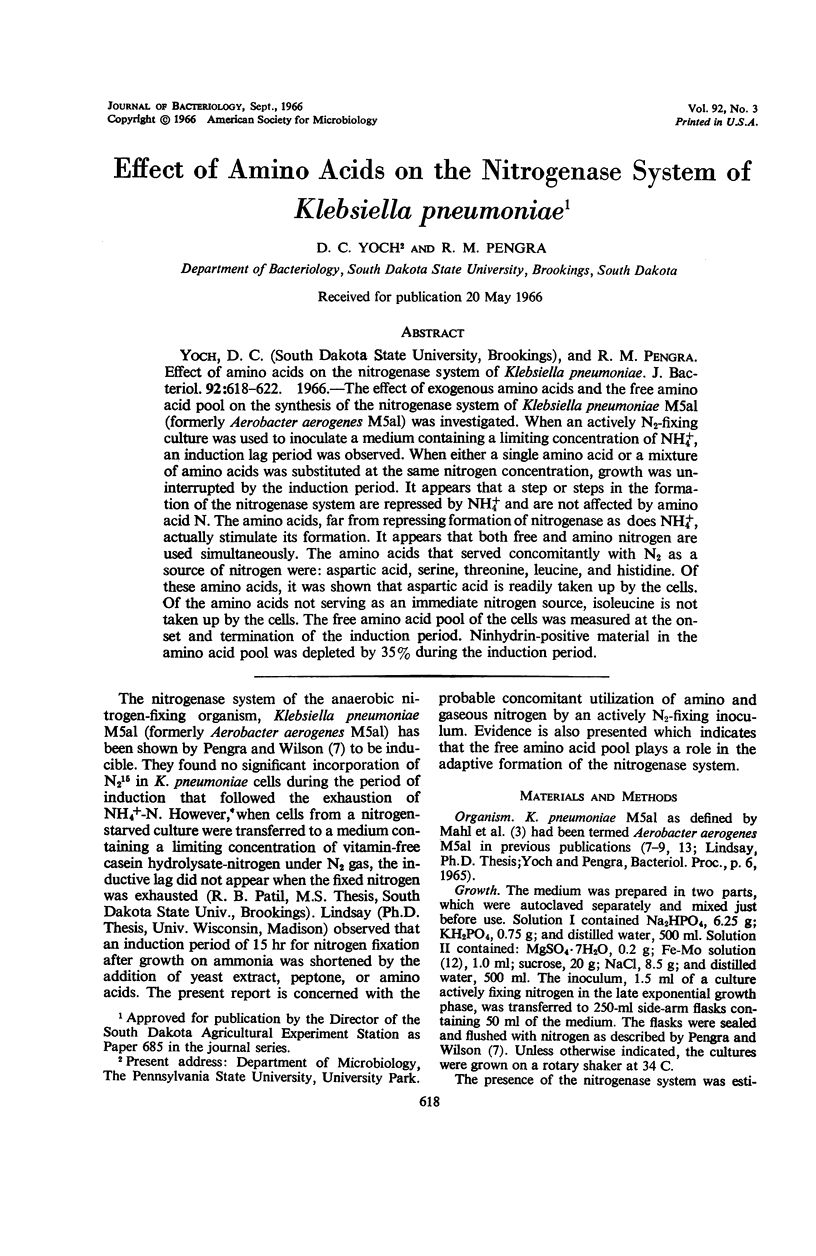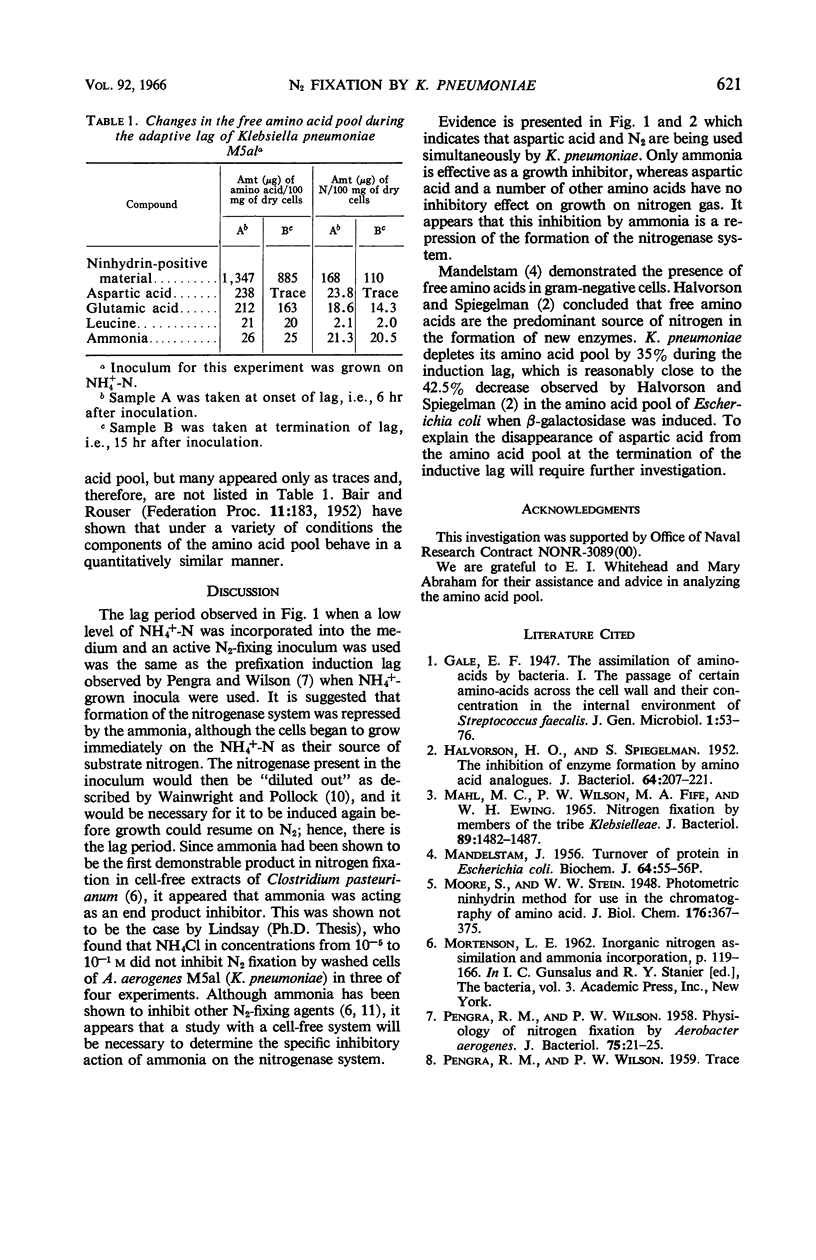Abstract
Yoch, D. C. (South Dakota State University, Brookings), and R. M. Pengra. Effect of amino acids on the nitrogenase system of Klebsiella pneumoniae. J. Bacteriol. 92:618–622. 1966.—The effect of exogenous amino acids and the free amino acid pool on the synthesis of the nitrogenase system of Klebsiella pneumoniae M5al (formerly Aerobacter aerogenes M5al) was investigated. When an actively N2-fixing culture was used to inoculate a medium containing a limiting concentration of NH4+, an induction lag period was observed. When either a single amino acid or a mixture of amino acids was substituted at the same nitrogen concentration, growth was uninterrupted by the induction period. It appears that a step or steps in the formation of the nitrogenase system are repressed by NH4+ and are not affected by amino acid N. The amino acids, far from repressing formation of nitrogenase as does NH4+, actually stimulate its formation. It appears that both free and amino nitrogen are used simultaneously. The amino acids that served concomitantly with N2 as a source of nitrogen were: aspartic acid, serine, threonine, leucine, and histidine. Of these amino acids, it was shown that aspartic acid is readily taken up by the cells. Of the amino acids not serving as an immediate nitrogen source, isoleucine is not taken up by the cells. The free amino acid pool of the cells was measured at the onset and termination of the induction period. Ninhydrin-positive material in the amino acid pool was depleted by 35% during the induction period.
Full text
PDF




Selected References
These references are in PubMed. This may not be the complete list of references from this article.
- HALVORSON H. O., SPIEGELMAN S. The inhibition of enzyme formation by amino acid analogues. J Bacteriol. 1952 Aug;64(2):207–221. doi: 10.1128/jb.64.2.207-221.1952. [DOI] [PMC free article] [PubMed] [Google Scholar]
- MAHL M. C., WILSON P. W., FIFE M. A., EWING W. H. NITROGEN FIXATION BY MEMBERS OF THE TRIBE KLEBSIELLEAE. J Bacteriol. 1965 Jun;89:1482–1487. doi: 10.1128/jb.89.6.1482-1487.1965. [DOI] [PMC free article] [PubMed] [Google Scholar]
- PENGRA R. M., WILSON P. W. Physiology of nitrogen fixation by Aerobacter aerogenes. J Bacteriol. 1958 Jan;75(1):21–25. doi: 10.1128/jb.75.1.21-25.1958. [DOI] [PMC free article] [PubMed] [Google Scholar]
- PENGRA R. M., WILSON P. W. Trace metal requirements of Aerobacter aerogenes for assimilation of molecular nitrogen. Proc Soc Exp Biol Med. 1959 Mar;100(3):436–439. doi: 10.3181/00379727-100-24653. [DOI] [PubMed] [Google Scholar]
- TEMPERLI A., PENGRA R. M., WILSON P. W. Some properties of a soluble and particle-bound hydrogenase in Aerobacter aerogenes. Biochim Biophys Acta. 1960 Mar 11;38:557–558. doi: 10.1016/0006-3002(60)91294-4. [DOI] [PubMed] [Google Scholar]
- Wilson P. W., Hull J. F., Burris R. H. Competition between Free and Combined Nitrogen in Nutrition of Azotobacter. Proc Natl Acad Sci U S A. 1943 Sep;29(9):289–294. doi: 10.1073/pnas.29.9.289. [DOI] [PMC free article] [PubMed] [Google Scholar]
- YOCH D. C., PENGRA R. M. MAGNESIUM REQUIREMENT OF AEROBACTER AEROGENES FOR ASSIMILATION OF MOLECULAR AND COMBINED NITROGEN. J Bacteriol. 1964 Sep;88:808–809. doi: 10.1128/jb.88.3.808-809.1964. [DOI] [PMC free article] [PubMed] [Google Scholar]


